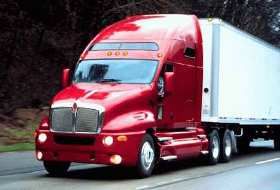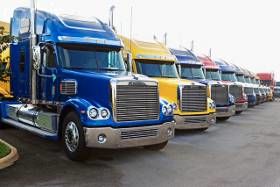LTL Trucking - My Linehaul Job
Topic 4501 | Page 30

Hi Jared.
Yes, most linehaul jobs are the same, save for the fact that some companies want their L/H drivers to work the dock too. Not sure if Fed Ex requires that, I know Con-Way Freight does, but they've been bought out by XPO, so we'll see if their policy changes. OD doesn't make their L/H drivers work the dock, unless you're at a small terminal that needs everybody to be a jack of all trades.
In regard to pay, most L/H gigs pay relatively the same, union or non-union. Top rate at OD is currently around .62 cpm for L/H drivers. It takes two years to reach top rate. At our terminal, we have some guys that are raking down 100k plus a year, but they've got the bigger runs. Most drivers are between 70k - 90k. It all depends on the miles.
My miles have been fluctuating, simply because I've been running wild or extraboard - by choice. I enjoy the variety, but really chose to run wild because that's all I can get right now to run days. I prefer days for the family. I can have a schedule if I run nights. Daylight schedules take a few years at my terminal, so if I wanna run days, I gotta go wild. Even still, running wild, I pretty much average 2500 miles a week, 10k a month. WIth all my accessory pay in addition to miles, I'm routinely grossing at least $1,500 a week, sometimes around $1,700. Not bad for getting to run daylight linehaul and being home every night. 
Biggest challenges? Getting to know some of the terminal locations in the metro NYC area. Getting used to running nights. Adapting to a demanding work schedule - pretty much the type of schedule most trucking jobs require, it's long hours.
But I love this job. Love this company. Love being a linehaul driver.
I'll write more later ....
Terminal:
A facility where trucking companies operate out of, or their "home base" if you will. A lot of major companies have multiple terminals around the country which usually consist of the main office building, a drop lot for trailers, and sometimes a repair shop and wash facilities.
Linehaul:
Linehaul drivers will normally run loads from terminal to terminal for LTL (Less than Truckload) companies.
LTL (Less Than Truckload) carriers will have Linehaul drivers and P&D drivers. The P&D drivers will deliver loads locally from the terminal and pick up loads returning them to the terminal. Linehaul drivers will then run truckloads from terminal to terminal.CPM:
Cents Per Mile
Drivers are often paid by the mile and it's given in cents per mile, or cpm.
HOS:
Hours Of Service
HOS refers to the logbook hours of service regulations.
Just finished reading this thread from start to finish...and want to say THANK YOU 6 string rhythm and all the others in this thread who've shared their information, insights and advice regarding LTL. I'm starting 3rd week of private CDL school tomorrow (Monday), and can't thank you enough for enlightening me about a portion of this industry I was not really aware of.
I'm in the Phoenix AZ area, so have a lot of options, and this thread just opened my eyes to an entire new set of options. Thank you for taking the time, when you were just starting out as brand new driver, to share what you were learning/experiencing...this has been a very, very educational thread for me, whether I go the LTL route or not.
Never stop being thankful for getting the job you got , and never let a day go by that you're not thankful to be with your family.
CDL:
Commercial Driver's License (CDL)
A CDL is required to drive any of the following vehicles:
- Any combination of vehicles with a gross combined weight rating (GCWR) of 26,001 or more pounds, providing the gross vehicle weight rating (GVWR) of the vehicle being towed is in excess of 10,000 pounds.
- Any single vehicle with a GVWR of 26,001 or more pounds, or any such vehicle towing another not in excess of 10,000 pounds.
- Any vehicle, regardless of size, designed to transport 16 or more persons, including the driver.
- Any vehicle required by federal regulations to be placarded while transporting hazardous materials.
LTL:
Less Than Truckload
Refers to carriers that make a lot of smaller pickups and deliveries for multiple customers as opposed to hauling one big load of freight for one customer. This type of hauling is normally done by companies with terminals scattered throughout the country where freight is sorted before being moved on to its destination.
LTL carriers include:
- FedEx Freight
- Con-way
- YRC Freight
- UPS
- Old Dominion
- Estes
- Yellow-Roadway
- ABF Freight
- R+L Carrier

Thank you Bsrlinmaz for your post. I get no greater satisfaction than knowing that somehow I've been able to be a blessing to somebody else. I'm happy to hear that you've benefited from the thread. And yes, attitude goes a LONG WAY. I'm just thankful that I'm healthy enough to provide for my family.
If you have any questions regarding LTL , I'm happy to try and help.
LTL:
Less Than Truckload
Refers to carriers that make a lot of smaller pickups and deliveries for multiple customers as opposed to hauling one big load of freight for one customer. This type of hauling is normally done by companies with terminals scattered throughout the country where freight is sorted before being moved on to its destination.
LTL carriers include:
- FedEx Freight
- Con-way
- YRC Freight
- UPS
- Old Dominion
- Estes
- Yellow-Roadway
- ABF Freight
- R+L Carrier
OWI:
Operating While Intoxicated

6-Stringer- Fantastic! You opened up a whole new world. Thanks.

6-Stringer- Fantastic! You opened up a whole new world. Thanks.
My pleasure.

6 String- Just sent you pm.

Hey 6 string great thread! You said you're making 10k a week then that you're grossing 1,800 a week with additional pay. Just wondering wut u meant by that. Also one of my reasons for getting onto otr trucking is savings to pay off student loans. I like that I can save on rent and car payments etc. when you drive line haul you of course will be paying a higher cost of living. do you think L h would still be more profitable in terms of sayings than flatbedding after you factor in those additional expenses? Thanks you
OTR:
Over The Road
OTR driving normally means you'll be hauling freight to various customers throughout your company's hauling region. It often entails being gone from home for two to three weeks at a time.
Line Haul:
Linehaul drivers will normally run loads from terminal to terminal for LTL (Less than Truckload) companies.
LTL (Less Than Truckload) carriers will have Linehaul drivers and P&D drivers. The P&D drivers will deliver loads locally from the terminal and pick up loads returning them to the terminal. Linehaul drivers will then run truckloads from terminal to terminal.HOS:
Hours Of Service
HOS refers to the logbook hours of service regulations.
Hey 6 string great thread! You said you're making 10k a week then that you're grossing 1,800 a week with additional pay. Just wondering wut u meant by that. Also one of my reasons for getting onto otr trucking is savings to pay off student loans. I like that I can save on rent and car payments etc. when you drive line haul you of course will be paying a higher cost of living. do you think L h would still be more profitable in terms of sayings than flatbedding after you factor in those additional expenses? Thanks you
Hi Justin. I've given more than a few examples of earning potential since starting this thread, not sure which one you're referring to. I've run different schedules, and therefore have had different paychecks.
The additional pay I was probably referring to was drop / hook / fuel pay. Each instance is $1.50. This is how my company compensates us - it will vary by company (some companies pay their linehaul drivers an hourly rate on top of mileage pay for certain tasks).
I've never claimed to gross $10k a week - that would be insane! Here's an example of a typical paycheck on a schedule that has 525 miles a day ( a good average for our terminal's runs ). I'll base this off of .60 cpm. I believe current top rate is .62 cpm and starting rate is .59 cpm. To drop / hook one entire set of doubles is 4 drop or hooks (dropping if you're breaking it, hooking if you're building it). If you're just building one set at your home terminal , dropping it at the destination, building another set, and bringing it back home, that would be 16 drop / hooks. So, below is a pretty solid average paycheck. Some earn less, some earn more. This is just a hypothetical example.
525 miles per day * .60 cpm = $315.00
17 drop / hooks / fuel per day at $1.50 per unit = $25.50
315.00 + 25.50 = $340.50 daily gross pay
340.50 * 5 = $1702.50 weekly gross pay
$1702.50 * .75 = $1276.88 NET weekly pay
NET is the same as "take home." For some reason, lots of folks say they're "taking home" a certain amount, when it's really just their gross pay before any deductions or taxes. For this example, I used 25% for taxes - a good estimate. I didn't include any other deductions like 401k, benefits, or disability. At our company, benefits are free for the single employee, family benefits or any dependents are extra costs.
I can't help you in regard to budgeting your personal finances. Not sure if that's what you were asking. Cost of living varies so much around the country. Plus, there are so many factors to consider. If you're just talking rent at maybe $600.00 a month, then subtract that from my example, and it might leave you with a decent monthly average for an OTR driver, depending on the pay scale. BUT, you're talking about OTR, which is never a static paycheck like a line haul driver who always has the same miles. There are so many things to consider when deciding between an OTR gig and a linehaul gig. Personally, linehaul for me IS trucking.
Terminal:
A facility where trucking companies operate out of, or their "home base" if you will. A lot of major companies have multiple terminals around the country which usually consist of the main office building, a drop lot for trailers, and sometimes a repair shop and wash facilities.
OTR:
Over The Road
OTR driving normally means you'll be hauling freight to various customers throughout your company's hauling region. It often entails being gone from home for two to three weeks at a time.
Linehaul:
Linehaul drivers will normally run loads from terminal to terminal for LTL (Less than Truckload) companies.
LTL (Less Than Truckload) carriers will have Linehaul drivers and P&D drivers. The P&D drivers will deliver loads locally from the terminal and pick up loads returning them to the terminal. Linehaul drivers will then run truckloads from terminal to terminal.Line Haul:
Linehaul drivers will normally run loads from terminal to terminal for LTL (Less than Truckload) companies.
LTL (Less Than Truckload) carriers will have Linehaul drivers and P&D drivers. The P&D drivers will deliver loads locally from the terminal and pick up loads returning them to the terminal. Linehaul drivers will then run truckloads from terminal to terminal.Doubles:
Refers to pulling two trailers at the same time, otherwise known as "pups" or "pup trailers" because they're only about 28 feet long. However there are some states that allow doubles that are each 48 feet in length.
CPM:
Cents Per Mile
Drivers are often paid by the mile and it's given in cents per mile, or cpm.
HOS:
Hours Of Service
HOS refers to the logbook hours of service regulations.
Thanks man I'm going to read through everything again. One more silly question, do these companies take say a driver who did one year flatbed prior? I'm not driving yet I'm just asking hypothetically how that would work.
Thanks again!
New Reply:
New! Check out our help videos for a better understanding of our forum features

















Preview:
This topic has the following tags:
Advice For New Truck Drivers Choosing A Trucking Company Doubles and Triples Linehaul LTL Driving Truck Driving Lifestyle







 TT On Facebook
TT On Facebook
So 6 string, looks like its been a lil over a year since you started this post. How have things changed for you since you been driving line haul til now? What have been some of the biggest challenges you've been faced with so far doing line haul? Has your paychecks stayed pretty consistent?
I just started as a part-time dock worker for FedEx, would like to shoot for OD, but been watching their website for months, and jobs just don't seem to come up that often. Understandable from the things you've said and other things I've heard about the company. So I have my foot in the door at FedEx, hoping to prove myself, then get into their driver apprentice program and let them train me for my CDL. Mostly from what I've read and hear, line haul is line haul is line haul. And the majority of it pays well. I did have the guy hiring me at FedEx openly make a comment when I asked a tax question on paperwork that I was filling out, that he has a couple "road drivers" that make 6 figures a year......so I perked up to that!
Gonna spend the rest of this week doing computer training stuff, but I'm ready to get out there and start proving myself.
CDL:
Commercial Driver's License (CDL)
A CDL is required to drive any of the following vehicles:
Line Haul:
Linehaul drivers will normally run loads from terminal to terminal for LTL (Less than Truckload) companies.
LTL (Less Than Truckload) carriers will have Linehaul drivers and P&D drivers. The P&D drivers will deliver loads locally from the terminal and pick up loads returning them to the terminal. Linehaul drivers will then run truckloads from terminal to terminal.